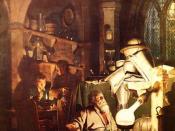His name was not Merlin or Ariel. He had no magical powers. He could not cause a fierce storm to appear out of nowhere. His name was John Dee. His fame spread when he caused people in the middle Ages to believe that he could turn a metal as common as lead into pure gold. Did he believe that he could change lead into gold? He did, or else he would not have spent so much of his time practicing the art of alchemy.
Alchemy has created for itself a multifaceted history. Alchemists were widely considered to be part of the occult (Hughes 40). In fact, their mystical practices led people to believe that alchemists were sorcerers or other occult practitioners (Hughes 40). Interestingly enough, while alchemists were considered to be sorcerers and practitioners of the occult, many alchemists believed that the practice of alchemy was not a type of occultism, but rather that it was a "gift of God" (Karpenko 63-80) and believed that alchemy was disclosed by God to a select few and not to the public, provided they meet a few requirements of obedience and are not closed off to God (Karpenko 63-80).
Being a sorcerer did not stop alchemists from spending much of their own money on their work. Unfortunately for the alchemists, the work they invested their money in did not always turn out to be very successful. Alchemists lost entire fortunes while practicing alchemy (Hughes 40).
During the Middle Ages, there were two opposing views on alchemy, the physical and the spiritual. Paracelsus (1493-1541), a famous alchemist, was more concerned with the physical aspects of alchemy. His end goal was using alchemy for medical purposes. On the other hand, the well-known alchemist John Dee (1527-1608) touted the spiritual aspects of alchemy. This revolved...


